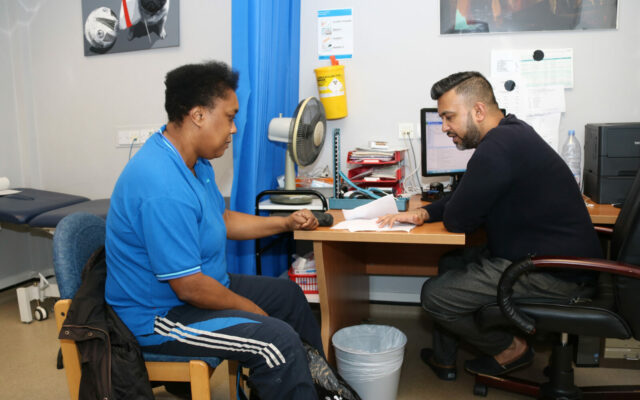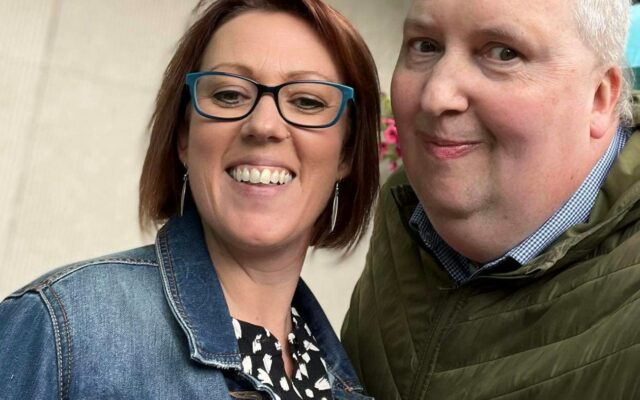Just after Greg Silvester was born, his parents Jackie and Peter had a visit from some friends. They looked at the new baby in the hospital incubator and declared that he wriggled so much he was sure to grow up to be a gymnast.
Jackie and Peter already knew that this was an unlikely outcome for a baby with Down syndrome. But, as Silvester now says, with remarkable understatement: ‘I was lucky. I did become a gymnast.’ He has won gold medals at the Special Olympics and become a coach, among other achievements.
Jackie tells Community Living she used to run a Mencap play scheme with a man called Alastair West. One day, he asked her: ‘Would your son like to do gymnastics?’ to which she replied: ‘I don’t know – ask him.’
Silvester said yes, thinking it would just be a bit of fun, but it did not take long for it to become clear that he had genuine ability, and West became his first coach.
In 1989, Silvester took part in his first Special Olympics Summer Games, where he won a bronze medal in gymnastics.
Then, in 1991, he took part in an international gymnastics and swimming competition in his home town of Wolverhampton, where he was spotted by a British Gymnastics coach. The coach arranged for Silvester to have extra coaching sessions twice a week in Wrenbury in Cheshire, nearly an hour’s drive away, where he was taken by his parents. He also continued with his coaching sessions in Wolverhampton. Things were getting serious.
Going for gold
Four years later came one of the high spots of his life. At the 1995 Special Olympics World Summer Games in Connecticut in the US, he won an amazing four gold medals, plus two silvers and a bronze.
‘I was on the rostrum with the medals. I felt really proud and I had a big smile on my face,’ he recalls.
He also became All Round World Gymnastics Champion. ‘Gymnastics was my main sport, but I have been in other sports besides that like athletics, swimming and table tennis,’ Silvester says.
Following this, he moved on to become a coach with British Gymnastics; he and his mother provided the training together. For the last 23 years, he has been a qualified mainstream gymnastics coach.
Currently, he is coaching eight people, one of them a 6-year-old boy with Down syndrome. Of two of his young athletes, he says: ‘They work extremely hard – they went to Athens in 2011. They came back with some medals so we were really proud of them.’
But it’s not all about medals. Silvester mentions a young man he worked with who just could not do a forward roll. ‘And then he actually mastered it and did it by himself. He had a big smile on his face. He said ‘Oh I couldn’t believe it’ and he got a big round of applause.’
Despite his successes, Silvester has occasionally met prejudice. ‘I have to be honest. I have Down syndrome. Sometimes people look at me thinking: ‘What’s wrong with him? Why does he look different?’ But I am no different to anybody else. Even though I might look different, all my feelings are exactly the same.
‘Sometimes other people can judge people with any sort of learning disability. I have been picked on and called different names under the sun. Which isn’t very nice, you know.’
He describes a distressing incident on a sports leadership course. ‘It was some lad being a bit cheeky and a bit cocky and he said ‘Oh look, here comes spakka’, which really hurt me. It really upset me inside.’
Silvester thinks one of the teachers spoke to the young man afterwards because the next day, having seen video of Silvester competing, he apologised. ‘He said to me: ‘Sorry, I didn’t realise you were famous.”
Silvester also experienced some unpleasant reactions while on tour with a display roadshow. One time, as he came out, he heard open laughter from some young men at the front. As he went into a series of press-ups, the laughter was swiftly silenced. He then went on to demonstrate ‘one-arm press-ups’ and ‘clap press-ups’. Afterwards, the men came up to him and shook his hand to show their respect.
Not what I expected
Jackie’s reaction on being told she had given birth to a baby with Down syndrome is one that many people will recognise: ‘I said what have I done to make him like that?’ She says her husband was devastated. The reality was completely unexpected.
‘To be honest, we have never looked back because he has enriched our lives completely. We’ve met so many people through Greg and we’ve made so many friends. At competitions, we always get together.
‘We’ve been really lucky with him because you never know, whichever baby you have, whether they have a disability or not, you don’t know what the future holds, do you? We went on to have two daughters as well, who have both been very, very supportive.’
Silvester now gives awareness talks to schools and colleges. He makes a point of saying that anyone with learning disabilities should have the chance to be part of their local sports activities.
He talks about the importance of building on a person’s ability rather than focusing on their disability. And he talks about his own life: ‘I’ve still got a learning disability but it doesn’t mean I can’t do things for myself, because I can. I live independently now – I’ve been living on my own for just over two years. It’s nice to get the message to people who are not educated or aware of any sort of learning disabilities.’
At one college, Silvester was due to give a talk to a class of students who were said to be somewhat unruly and disruptive. However, he soon had them rapt with attention. His father Peter, who was there, says: ‘You could have heard a pin drop.’
After the talk, Peter collected the feedback forms. ‘It was unbelievable. It brought tears to my eyes. The actual good reviews of Greg’s speech,’ he says. ‘That just shows – doesn’t it? – that he can inspire the younger ones.’
For the past nine years, Silvester has also had a day job. He works part time for Cadent, a gas supplier, doing administration in the office, and holds an NVQ 2 qualification. While he clearly enjoys the job, his heart remains in the world of sport.
Now, aged 42, his main sport is table tennis and he has a competition soon.
Hall of fame
One source of satisfaction is the way that his achievements have been recognised. He was inducted into Wolverhampton’s hall of fame, which celebrates local sporting heroes.
He was also chosen to carry the Olympic torch in Auckland in New Zealand in 2000. In the same year, he was chosen as one of the 12 People of the Year by RADAR (the Royal Association for Disability and Rehabilitation, now known as Disability Rights UK).
Silvester has taken part in many displays including one in Malta for 250 people with the country’s president and prime minister present. He was also presented to Princess Diana when she had just become a mother. Someone whispered to him to ask how her new baby was. Silvester says that, luckily, he remembered the name and asked: ‘How’s William?’ ‘She was brilliant!’ he says, adding how sad he was to hear the news when she died.
One of the barriers to sports that Silvester and his family have experienced is a lack of funding. The Special Olympics depend on individual, trust and corporate donations, and receive no government funding.
The family are often involved with fundraising to help cover the costs of attending games around the world and they receive a lot of support from friends. Two of these friends are also planning to write about him. ‘They are doing a book on me. About my life. What I am like and how I have come from a young baby to an adult,’ he says.
Taking to another stage
In March this year, Silvester went out to the Special Olympics Summer Games in Abu Dhabi as a director on the board of Special Olympics Great Britain – ‘a nice experience,’ he says. He was proud to be representing the organisations.
He has been involved for many years in drama groups and is now writing a play. He has a dream of one day being a TV presenter: ‘I could do a sports programme or a documentary for people with any sort of learning disability.’
I first saw Silvester speaking on TV as part of a documentary about Eunice Kennedy Shriver, the founder of the Special Olympics movement, and he was a natural on the small screen. So, any TV executives who are reading: you know what to do.
It is clear that Greg Silvester has had an amazing life with remarkable achievements. Despite his sporting talents, life has not always been easy. But he says: ‘Up to now things have changed completely and I have got a great job, a great family and a great life ahead of me.’
Sean Kelly was chief executive of the Elfrida Society from 2001 to 2012 and is now a freelance writer and photographer




